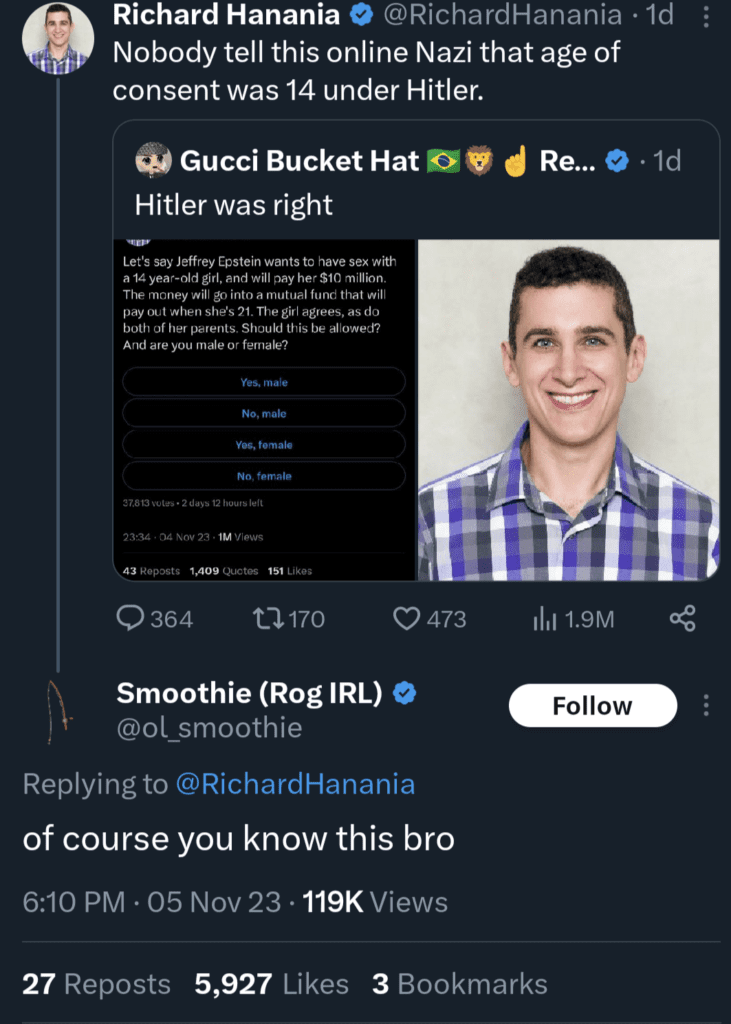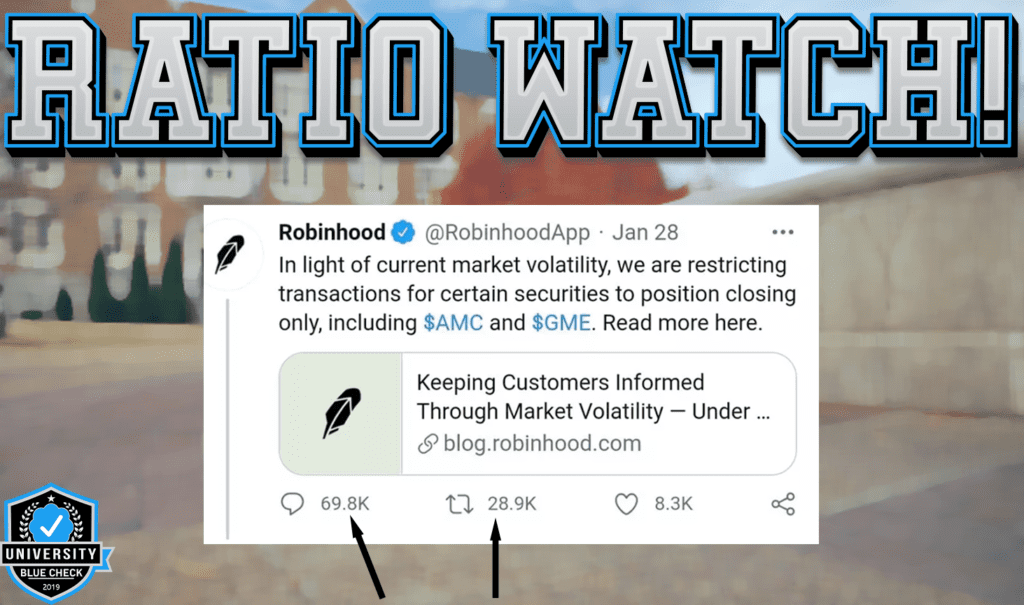It’s been a long time since we last made a post here at Blue Check University. Between behind-the-scenes work and preparation for end-of-the-year competition voting, we promise we’ve been busy trying to create the best experience for followers across the web and social media. Sometimes, however, a tweet and ratio are SO BAD, we need to stop and point it out for everyone. Seemingly out of nowhere and prompted by nothing at all, one blue checkmark decided to drop one of the worst tweets you’ll ever see, no matter the year. With the help of AI for the first time on a site post, we’ll tell the brief story of how Richard Hanania could be so awful in such a few amount of tweets.
Who is Richard Hanania?
Like many people featured on the site, Richard Hanania is a name that is primarily known in the Twitter (or X) world and really nowhere else of note.



With a profile that has a bunch of letters and acronyms nobody knows or cares about, we decided to use ChatGPT to help with some biographical details for Richard today.
Richard Hanania is a thought-provoking figure in the landscape of political science and public discourse, whose background paints a portrait of academic rigor intertwined with an unflinching willingness to challenge conventional wisdom. With a Ph.D. in Political Science from the University of California, Los Angeles, Hanania has woven a rich tapestry of research, focusing on international relations and political psychology. His scholarship has often centered around the exploration of power dynamics within the realm of foreign policy and the underpinnings of political behavior. Beyond academia, Hanania has established himself as a prolific writer and commentator, contributing to the marketplace of ideas with essays and articles that delve into contentious and often polarized debates. As the president of the Center for the Study of Partisanship and Ideology, he continues to drive conversations that question the status quo, sparking discussions that resonate with a diverse audience ranging from policy wonks to the intellectually curious layperson.
ChatGPT
ChatGPT was a bit too nice when describing Mr. Hanania, as their descriptions give the impression that he is actually relevant. Just take a look at how they describe his Twitter habits:
Richard Hanania has carved out a distinctive presence on Twitter, where his profile is not just a reflection of his professional pursuits but also a platform for a broader, more candid engagement with current events and ideological debates. Known for his prolific tweeting, Hanania uses the platform to disseminate his work, share thought-provoking analyses, and often, to initiate discussions that sometimes stir controversy or challenge prevailing narratives. His Twitter feed acts as a real-time chronicle of his intellectual journey, displaying a blend of scholarly musings, policy critiques, and occasional forays into the lighter side of political discourse. His approach to social media is emblematic of a new generation of public intellectuals: unbounded by traditional media gatekeepers, deeply interactive, and ready to test the boundaries of public debate in the digital age. Whether live-tweeting reactions to unfolding political developments or engaging in rapid-fire exchanges on complex topics, Hanania’s Twitter habits underscore his role as a dynamic participant in the fast-paced and often tumultuous arena of online public discourse.
ChatGPT
Once again, a VERY generous description of Richard and what he does in the Twitter world. Would ChatGPT provide us with his negative qualities as well?
While Richard Hanania is recognized for his incisive commentary and academic achievements, his approach has not been without criticism. Detractors often point to his sometimes provocative Twitter presence, suggesting that his online rhetoric can occasionally overshadow the nuance of his scholarly work. Critics argue that his willingness to engage in contentious topics can sometimes veer into contentious territory, potentially alienating those who might otherwise be receptive to his perspectives. Furthermore, some have expressed concerns that his contrarian stances, while intellectually stimulating, might contribute to polarized discourse, potentially oversimplifying complex issues in the rapid-fire context of social media debates.
ChatGPT on the negatives of Richard Hanania
There’s also a critique to be made about the balance between public intellectualism and academic responsibility. While Hanania’s forthrightness in expressing his views is part of a broader engagement with ideas in the public sphere, it can sometimes blur the lines between his personal opinions and his professional expertise, leading to potential misunderstandings about the nature of his academic work.
Additionally, in today’s politically charged climate, figures like Hanania who frequently wade into hotly debated topics are susceptible to intense scrutiny, and their words can sometimes be taken out of context or magnified, leading to controversies. As such, while Richard Hanania’s presence adds a vigorous voice to policy discussions and academic debates, the potential negatives, primarily in terms of the public reaction and interpretation of his work, illustrate the tightrope walked by public figures who actively engage in the rough-and-tumble of social media-led discourse.
Meh……could’ve been worse but some accurate points. We’re still working on our skills with implementing AI on the site. With all of that being said, you should have a general idea of who Richard Hanania is. But even with this information, it’s hard to prepare anyone for what you’re about to read.
Richard Has a Question
Richard is no stranger to the occasional “weird” tweet. While he focuses primarily on “anti-woke” related topics, Hanania will opine on a variety of issues and subjects. With takes ranging from being quite strange to downright sinister, Richard craves the attention that accompanies such opinions. Here’s one example of the latter:
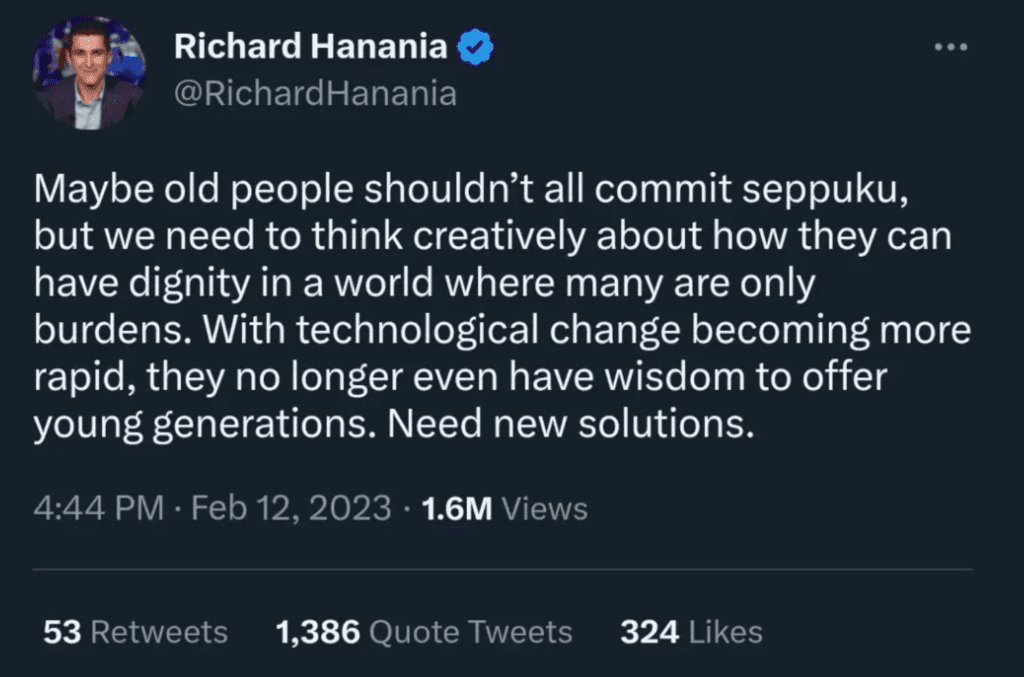

Always one for controversial tweets like the above, Richard is no stranger to having the ‘unpopular’ opinion and subsequent ratio that follows. This take, for example currently ranks 29th in our Twitter Ratio Rankings list as of 11/6/2023. What we didn’t think was possible, however, was for him to tweet something that managed to be MUCH WORSE than this one. And it all started with a poll question of his:
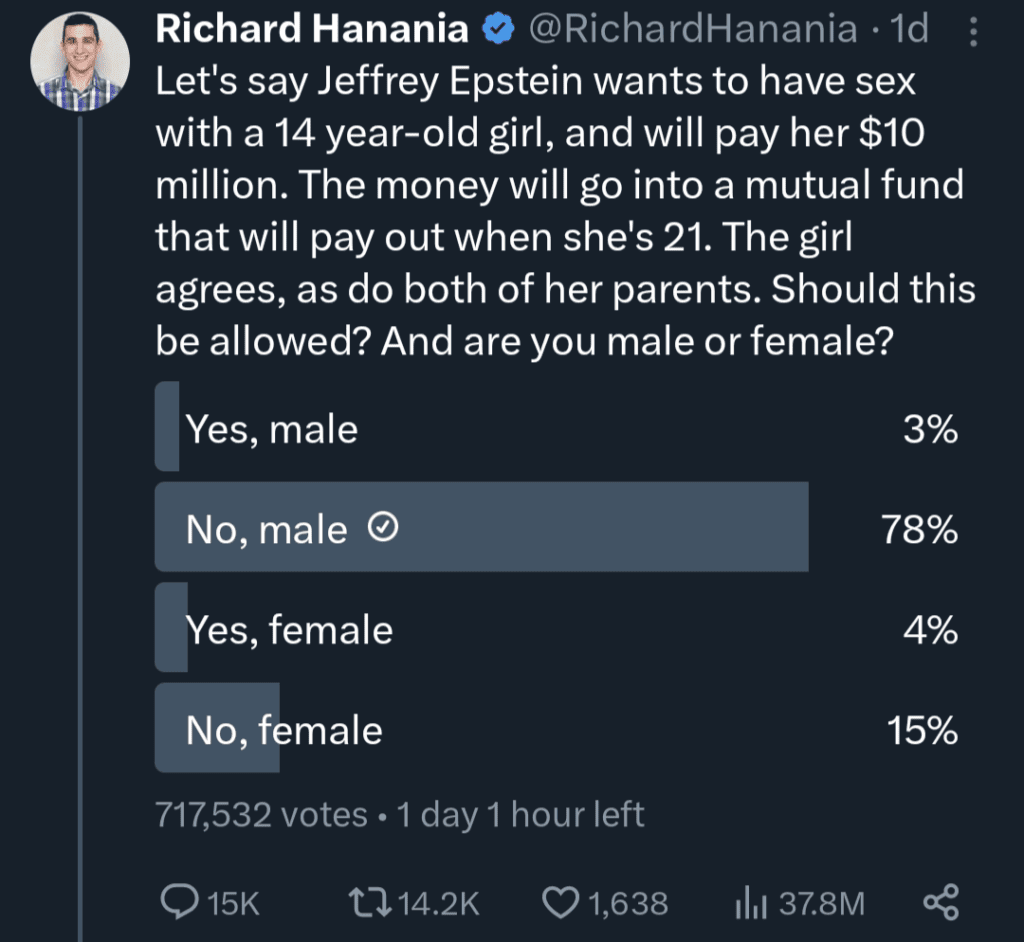

You read that right. A question so absurd and insane that it’s hardly worth even explaining. The reactions in the replies and Quote Tweets were exactly what you’d expect as well. And before anyone asks, Richard answered this question back in December:
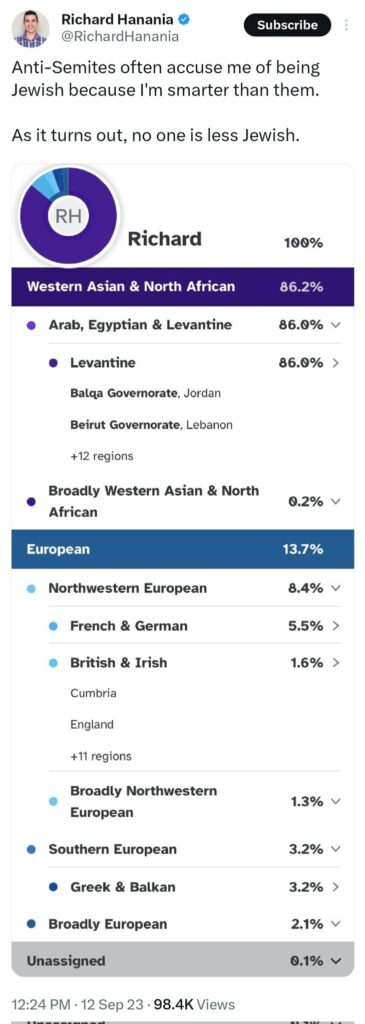

As the quote tweets were piling up and Richard’s shit tweet spread across the site, he refused to delete the poll that was decisive in the outcome from the onset. On the contrary, Richard managed to DOUBLE DOWN on his reasons for posting in the first place:
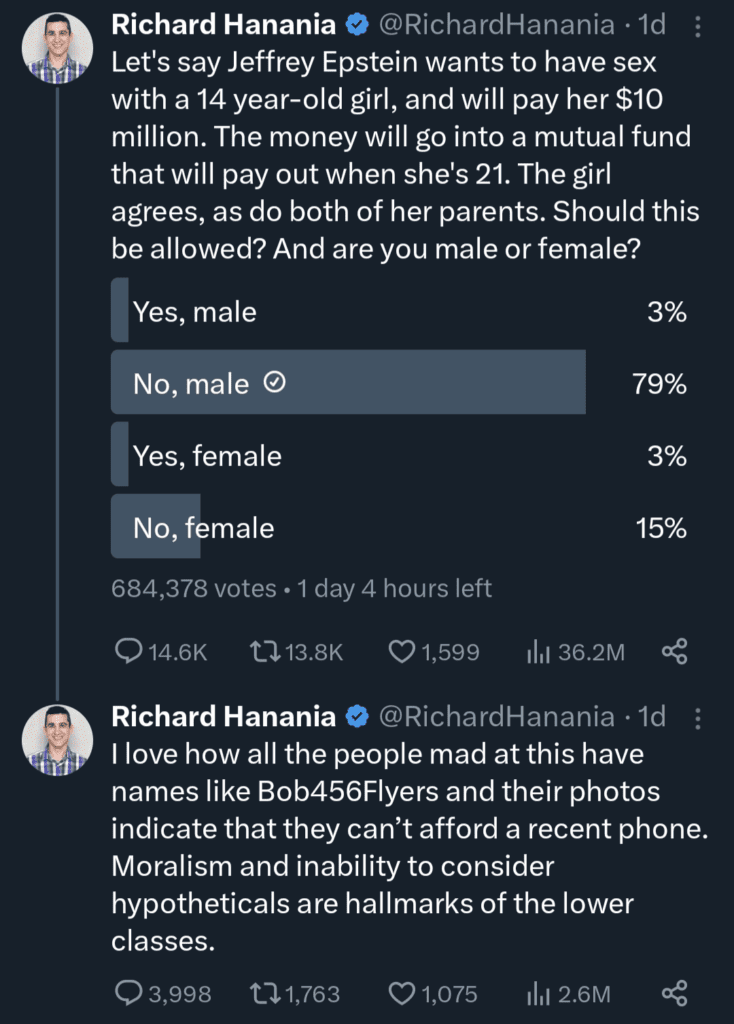

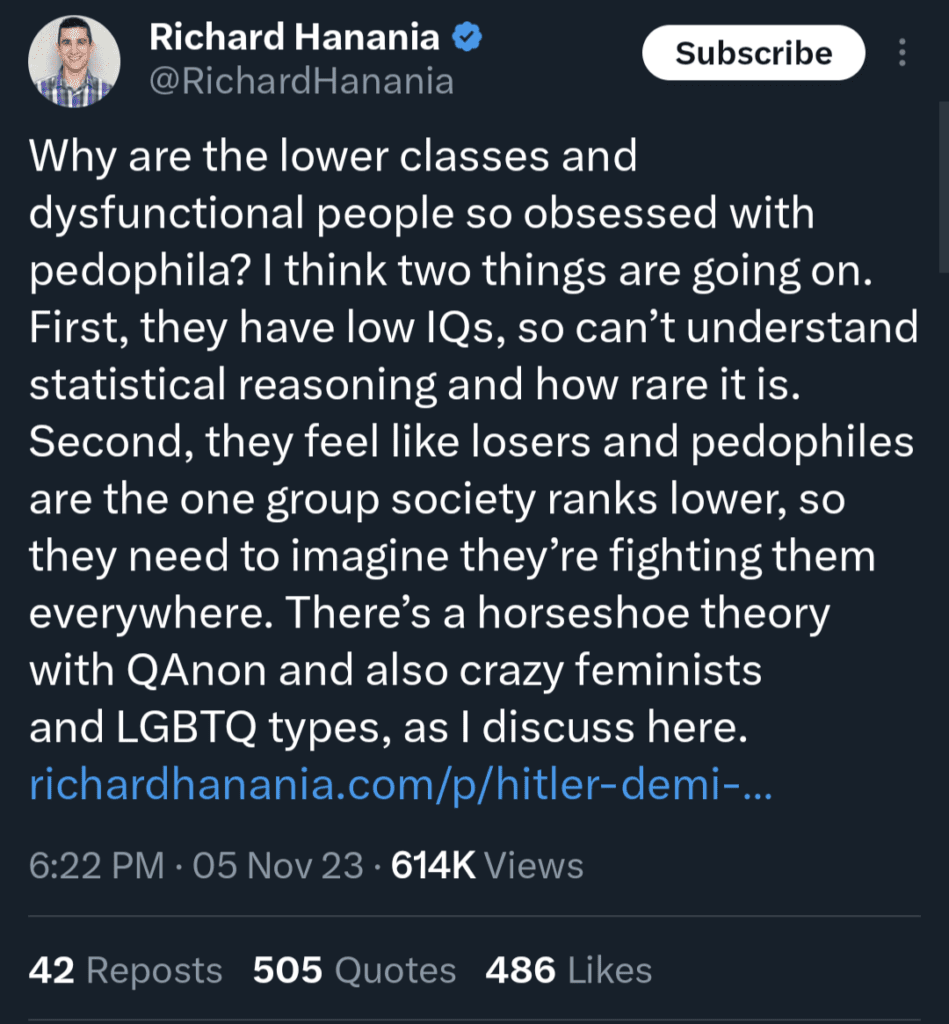

With responses that read as twisted satire if you didn’t know the speaker, it’s hard to really add much more to this. Because of the Tweet’s popularity, it is a bit too early to add it to our Ratio Rankings, along with his clownish follow-ups that somehow made him look worse. We also were able to create a few blank templates of Richard using AI, so feel free to use those for meme-making. Check back to this post for any additional tweets Richard crafts that are on the subject at hand

